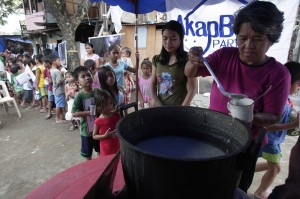In spite of its successes, the government’s conditional cash transfer (CCT) program is not the solution to rising hunger in the country, according to a nongovernmental organization.
FoodFirst Information and Action Network (FIAN) Philippines criticized the Aquino government’s reliance on the dole in easing poverty and reducing hunger, saying the program was insufficient to deal with these problems.
“This program has a wide coverage and contributes to children’s economic access to food. However, it remains very inadequate and is conditioned on performing other obligations whereas the right to food, which is a basic human right, is unconditional,” said Aurea Miclat-Teves, FIAN Philippines president.
In a statement from the group issued Wednesday, Teves said the supply of conditional services, such as schools and medicines “has been far behind the demand for these services.”
“The CCT program is not part of a coherent food policy,” Teves said.
FIAN Philippines said the rising hunger in the country was partly due to the lack of a comprehensive national food policy. It pointed to an urgent need for laws that would require full and active participation of all sectors concerned, including those most vulnerable to hunger.
Last week, a Social Weather Stations (SWS) survey showed that 21 percent of the population, or an estimated 4.3 million families, went hungry at least once in the last three months, up from 18.4 percent in May.
The spike resulted from an 18 percent increase in “moderate hunger,” defined by SWS as having nothing to eat once or a few times.
Overall hunger rose the sharpest in Metro Manila by 10 points to 26 percent, or an estimated 738,000 families.
Teves said the results of the hunger survey were “unacceptable and alarming.”
“In a country with a total population of almost 100 million, 1 percent is too many, 21 percent is too much. Not this many people were ever hungry before,” Ricardo Reyes, FIAN Philippines vice president, said.
“Old folks used to say that even during the Japanese occupation, hunger did not become a problem because our land has been blessed with fertile land and plenty of water and sunshine,” he said.
The group urged President Aquino to draw up a national food policy so the Filipino people would have reason to celebrate World Food Day on Oct. 16.
World Food Day is celebrated to remember the founding of the Food and Agriculture Organization of the United Nations in 1945.
Referring to the study “The Filipinos’ Right to Food: An Assessment of the Philippine Legal Framework Governing the Right to Food” by Virgilio de los Reyes and Maria Socorro I. Diokno, Teves said current laws do not ensure availability, accessibility and safety of food for the entire population.
